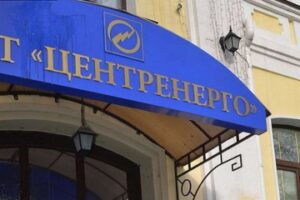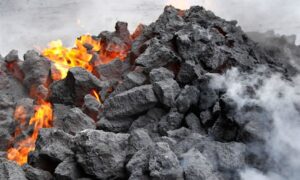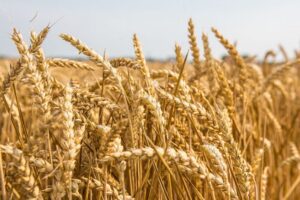
On the night of February 16-17, the Maran Excellence ship with 160,000 tonnes of Colombian coal for the needs of PJSC Centrenergo moored in the port of Pivdenny, unloading is underway at a deep-sea berth, the press service of the generating company reported.
“One of the largest bulk carriers (capesize), with a deadweight (maximum allowable load) of more than 180,000 tonnes, delivered 160,000 tonnes of high-quality Colombian coal to Ukraine for the needs of the Centrenergo generation,” the company said on its website on Thursday .
It notes that such a significant consignment of coal was delivered to Centrenergo for the first time by sea in accordance with contracts concluded with international traders.
“Despite the difficult situation that has developed in the Black Sea due to the training of the Russian Federation, the vessel successfully passed through a safe additional corridor to the Ukrainian port and arrived at its destination according to the schedule,” the generating company stressed.
Until the end of February this year, Centrenergo expects the next two ships with a total volume of coal of 214,000 tonnes.
The company assured that the replenishment of stocks at warehouses of thermal power plants due to the diversification of coal sources and the support of the Ministry of Energy and the State Property Fund of Ukraine will allow confidently going through the heating season and ensuring the reliable operation of the Ukrainian power system during peak hours.

Ukrainian coke and chemical plants in January of this year imported 860,000 tonnes of run-of-mine coking coal and coal concentrate for coking, which is 5.2% more than in the same period last year.
According to an information statement of the Ukrmetalurgprom association on Monday, the supply of Ukrainian coal for this period amounted to 280,000 tonnes, which is 11.6% lower than in January 2021.
In general, in January 2022, Ukrainian coke and chemical plants received 1.14 million tonnes of coal for coking, which is 0.5% more than in January 2021. At the same time, the share of imported coal in the total supply amounted to 75.5% in January 2022 versus 72.2% in January 2021.
Some 772,000 tonnes of coke (106% compared to January 2021), including 668,000 tonnes of Ukrainian origin (95%), and 104,000 tonnes of imported coal (4.16 times more) were supplied to Ukrainian steel enterprises in the specified period. The share of imported coke in the total supply amounted to 13.47% versus 3.43% in January 2021.
In addition, last month, 237,000 tonnes of scrap metal were collected (78.2% compared to January 2021), of which 231,000 tonnes (81.3%) were supplied to Ukrainian consumers as imported. Export of scrap metal in January amounted to 6,000 tonnes (31.6% compared to January 2021).
It is noted that the provision of steel enterprises with Ukrainian iron ore raw materials in January 2022 was carried out in accordance with the needs of metallurgical production. There were no imports of iron ore. Export of iron ore for the first month of the year amounted to 3.85 million tonnes (104.3% compared to January 2021).
According to updated data of Ukrmetalurgprom, in January 2022, plants produced some 2.785 million tonnes of sinter (101.3% compared to January-2021), 807,000 tonnes of 6% moisture gross coke (95.5%), 1.786 million tonnes of cast iron (98.2%), 1.851 million tonnes of steel (100.7%), 1.672 million tonnes of rolled products (100.6%), and 91,000 tonnes of pipe products (168.2%).
As of February 11, 2022, of the main operating production facilities, 17 out of 21 blast furnaces, seven out of eight open hearth furnaces, 13 out of 16 converters, five out of 15 electric furnaces and 16 out of 17 continuous casting machines were in operation.

Ukraine’s revenue from export of grain crops in 2021 amounted to $12.3 billion, the largest trading partners were China, which imported $2.55 billion, as well as Egypt ($1.39 billion) and Turkey ($0.92 billion), the Institute of Agrarian Economics (IAE) reported on its website on Thursday.
“2021 was characterized by the further strengthening of the position of China, which in 2020 for the first time took the top among 10 largest importers of Ukrainian grain. In four years, starting from 2018, this country has increased its grain purchases from Ukraine almost five times, to $2.55 billion. At the same time, China’s share in the value of domestic grain exports increased from 19.7% in 2020 to 20.7% in 2021,” the IAE said, citing expert Bohdan Dukhnitsky.
According to the IAE, last year Egypt increased imports of Ukrainian grains by 24%, from $1.12 billion to $1.37 billion, but its share of their total exports decreased from 11.9% to 11.2%.
“Turkey, which in 2020 ranked only sixth in the top 10, moved up to the third spot last year, increasing the value of purchases of Ukrainian grain to $0.92 billion. In addition, in 2021, there were changes in the top 10 largest buyers of grain from Ukraine: Iran and Pakistan pushed South Korea and Bangladesh out of the top 10,” the expert said in the IAE report.
Other major grain importers from Ukraine were Indonesia with $750 million, Spain with $645 million, the Netherlands with $552 million, Iran with $533 million, Pakistan with $355 million, Libya with $342 million and Tunisia with $306 million.
The IAE said that in total, these 10 countries had dominated in the value of all grain purchases in Ukraine in 2021 (their share was more than two thirds).
As reported, since the beginning of 2021/22 (July-June) and as of February 2, Ukraine exported 38.63 million tonnes of grain and leguminous crops (31.6% more compared to the same date of the previous year), including 17.08 million tonnes of wheat (30.4% more), 15.64 million tonnes of corn (32.6% more), 5.48 million tonnes of barley (38.7% more), 0.16 million tons rye (92 times more), 63,800 tonnes of flour (27.0% less).

Ukraine in 2021 imported 8.791 million tonnes of oil products (according to foreign economic activity code 2710: gasoline, diesel fuel, fuel oil, jet fuel, etc.), which is 9.6% more than in 2020 (8.023 million tonnes).
According to the State Customs Service, oil products were imported in the amount of $5.615 billion, which is 65.3% more than in 2020 ($3.397 billion).
Belarus supplied fuel for $2.351 billion (share – 41.87%), Russia – for $1.241 billion (22.09%), Lithuania – for $654.584 million (11.66%), other countries – for $1.369 billion (24.37%).
In addition, Ukraine exported 308,716 tonnes (more 3.3% compared to 2020) of oil products for a total of $192.65 million (up 50.3%). The cost of fuel delivered to counterparties from Latvia amounted to $36.779 million, Estonia – $32.636 million, Malta – $18.81 million, other countries – $104.425 million.